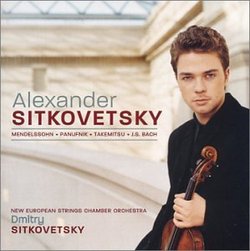| All Artists: Felix [1] Mendelssohn, Andrzej Panufnik, Toru Takemitsu, Johann Sebastian Bach, Dmitry Sitkovetsky, New European String Chamber Orchestra Title: Alexander Sitkovetsky Plays Mendelssohn, Paunufnik, Takemitsu, Bach Members Wishing: 0 Total Copies: 0 Label: EMI Europe Generic Original Release Date: 1/1/2000 Re-Release Date: 1/13/2004 Album Type: Import Genre: Classical Styles: Chamber Music, Forms & Genres, Concertos, Historical Periods, Baroque (c.1600-1750), Classical (c.1770-1830), Instruments, Strings Number of Discs: 1 SwapaCD Credits: 1 UPC: 724355744029 |
Search - Felix [1] Mendelssohn, Andrzej Panufnik, Toru Takemitsu :: Alexander Sitkovetsky Plays Mendelssohn, Paunufnik, Takemitsu, Bach
 | Felix [1] Mendelssohn, Andrzej Panufnik, Toru Takemitsu Alexander Sitkovetsky Plays Mendelssohn, Paunufnik, Takemitsu, Bach Genre: Classical
Alexander Sitkovetsky comes from a remarkable musical family. His mother Olga and his great-aunt Bella Davidovich are distinguished pianists; the former accompanies him on his first CD, Sasha, while the latter shared his N... more » |
Larger Image |
CD Details
Synopsis
Amazon.com
Alexander Sitkovetsky comes from a remarkable musical family. His mother Olga and his great-aunt Bella Davidovich are distinguished pianists; the former accompanies him on his first CD, Sasha, while the latter shared his New York debut recently, and his uncle Dmitry joins him on this record as conductor and violin partner. Born in 1983 in Moscow, Alexander, a splendid violinist, is already embarked on a flourishing career. His superior talent was discovered by Yehudi Menuhin, who invited him to study at his School in England and became his mentor, champion, and inspiration. His spirit hovers over this disc: he "discovered" the Mendelssohn Concerto on this disc, a much earlier composition than the famous one, and commissioned and premiered the works by Panufnik and Takemitsu. Otherwise, the program is distinguished primarily by its novelty and unfamiliarity, not a bad idea for a young performer's first record with orchestra. Mendelssohn wrote this concerto at t! he age of 13; it is a bit simplistic, full of scales and sequences, and frankly under the influence of past masters of the form. However, it also harbors the seeds of future greatness in its careful construction, sweet, lyrical melodies, and romantic ardor. The Panufnik Concerto also has a singing quality well suited to the violin. It opens with a long passage for violin alone; several more cadenzas serve as links between sections. In the slow movement, the soloist spins long lines over a rocking accompaniment; the Finale is sprightly, with quirky rhythms reminiscent of Prokofiev. Takemitsu's "Nostalgia," one of a series of musical memorials he wrote for a number of friends, is mournful, dreamy, ethereal. Sitovetsky is a brilliant virtuoso with an easy, masterful technique and a beautiful, focussed tone instantly adaptable to every mood; his playing is very expressive, but, perhaps as a result of growing up among forceful musical personalities, his ideas and feelings sometim! es seem to be "learned" rather than inwardly experienced. The Bach Double Concerto is austere, clean, clear, and quite brisk; the slow movement is lovely. --Edith Eisler

 Track Listings (10) - Disc #1
Track Listings (10) - Disc #1